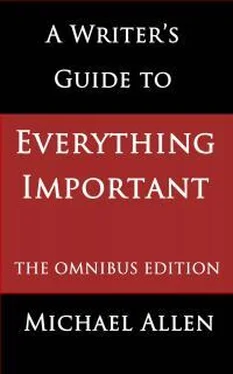By all means climb on board this Ship of Fools if you wish: her name is the good ship Nincompoop . Among the passengers you will find lots of agreeable companions (including the author of this very tome). But you should not, I suggest, mislead yourself. You should not imagine that, by climbing the gangplank of this particular ship, you are doing anything sensible, clever, or wise.
5.2 Cautionary tales
Or, Be careful what you wish for.
In this, the penultimate section of my consideration of success, I provide a small number of cautionary tales: a small number, that is, compared with the number I could supply.
It is just possible, you see, that achieving success might have disadvantages. Even trying to achieve success can prove disastrous.
One British writer who is exactly my own age (I won’t name him because he evidently has enough problems already) had a big success with a novel in the late 1960s. It was given five-star reviews in all the right places, described as ‘sensitive’, a ‘reflection of our troubled times’ and all the rest of it. A successful film version was made; it was adapted into a play for the stage; and the book was adopted as a text for teaching in schools. Unfortunately this author never seems to have written anything else, and thirty years or so after his initial success, The Times reported that he was bankrupt.
Many a writer has become clinically depressed by failing to get a book into print, which is unfortunate to say the least. The most famous case is that of the American novelist, John Kennedy Toole. In the early 1960s he became deeply disturbed by the frequent rejection of his book A Confederacy of Dunces , and in 1969 he committed suicide as a result.
Toole’s mother then took on the task of trying to find a publisher for the book on which her son had laboured so hard. She finally managed it, and in 1981 the novel was awarded the Pulitzer prize, which is the most prestigious of all literary awards in the USA. A Confederacy of Dunces was hailed by The New York Times as a ‘masterwork of comedy’. A bit late in the day for its author.
And finally, I noticed with some amusement that, on a day when I was actually working on this section, The Times made reference to the fact that Stephen King had ‘famously battled with drugs and alcohol after the first flush of fame struck.’ Famously battled, eh? First I’d heard of it, actually, but then I’m not a King fan. I admire enormously his industry and prolific story-telling, and he has written some interesting stuff on the art of fiction – but I’m not an enthusiast for his novels.
The principal story to be told in this section is, however, is the story of Ross and Tom, and how they were both destroyed by success. I have often maintained that the worst thing that can happen to a young writer is that she should achieve a massive success before she understands how it has been achieved, and without knowing how to do it again. Here is proof writ large.
5.3 Too much, too soon
Ross and Tom is the title of a book by John Leggett; its subtitle is ‘two American tragedies’, and for once the use of the word tragedy may be legitimate.
The Ross and Tom of the title were Ross Lockridge and Thomas Heggen. Leggett’s account of their lives, and deaths, first appeared in 1974, but was reissued in 2000.
In brief, Ross and Tom were two young novelists. They never met, but their careers ran on parallel lines.
In the few years which followed the second world war, both young men enjoyed enormous success with their first books: they became rich and famous. But neither man could cope with the fame and the fortune; worse, they were under constant pressure to write another book, and they didn’t know how to do it. In the end, Ross and Tom cracked under the strain, and they both committed suicide, though in each case their families, naturally, tried to convince themselves that the death was accidental.
Ross Lockridge grew up in Bloomington Indiana, and, although it was the seat of Indiana University, Bloomington seems to have bred a small-town mentality in its young people. Above all, it appears to me that Ross Lockridge’s educators failed him. He was a brilliant student at school, but his brilliance seems to have resided mainly in an ability to absorb facts and to regurgitate them in the form required by his teachers. No one, apparently, thought it important that he should learn to think for himself, or that he should question the received wisdom about anything. Despite all his ‘brilliance’, Ross seems to have been incapable of original thought.
In 1933, Ross was one of many University of Delaware students who went on a junior-year-abroad program. His group went to Paris. And what did Ross do in a year in Paris? He got drunk – once. He got laid – once, when an American girl dragged him off to bed. He did not visit any of the nude shows for which Paris was famous; he did not haunt the jazz clubs; and, curiously for a man who had already declared some intention of becoming a famous writer and producing the Great American Novel (God help us all), he made no attempt whatever to mix with any of the literary personalities who were then to be found hanging around Parisian cafes.
What Ross Lockridge mainly did in Paris was stay in his room and read his college books. And at the end of the year he came out top. He was the leading scholar among all the étudiants étrangers .
What did he do then? Did he set out to explore Europe, as any reasonably enterprising person would? No, he just got right back on the first available boat and went home to Mom.
It is no exaggeration to say that, by page 55 of Leggett’s 200-page account of Ross’s life, I could already see how this kid was doomed. He had absorbed every half-baked piece of nonsense about ‘great literature’ that the American liberal-arts education could provide. And he had decided that he too wanted to make a giant contribution to ‘literature’. This foolish and ill-judged ambition would eventually kill him.
Ross Lockridge went on earn his living as a college lecturer, and in his spare time he worked on his intended masterpiece, Raintree County.
The book was based very largely on his own family history; it was heavy with symbolism; and it was long. Boy, was it ever long. Even the published version runs to 1066 pages. The manuscript contained 600,000 words, which is approximately ten times the length of Ian Fleming’s first James Bond novel (which would be published just five years later).
Perhaps the worst thing that could have happened to Ross Lockridge was that this bizarre monster should find a publisher. But it did: Houghton Mifflin, a well respected Boston firm. The publisher wanted changes to the text – not surprisingly – and Ross was greatly anguished over ‘compromising his integrity’; but he did it.
Then, even before the book was published, he won a major and highly prestigious prize, offered by MGM, which involved sale of the film rights for a huge sum of money. But MGM also wanted changes – not surprisingly – and once again the young author had to face the enormous labour of reducing this vast manuscript to a more manageable shape.
And then thirdly the Book of the Month Club wanted his novel, but only if he would make further changes. And so on. And on, and on.
In short, over a period of many years, Ross Lockridge invested a massive amount of time and emotional energy in producing a huge book. This effort was rewarded, in a sense, when the novel was finally published. He became famous – at any rate insofar as any writer can be said to be truly famous. And he had buckets of money emptied over his head.
But there was just one problem. Everyone wanted him to do another book. His publisher expected it. The readers expected it. The critics expected it. And Ross Lockridge knew that a writer ought to go on writing. But he simply didn’t know what to do next.
Читать дальше












